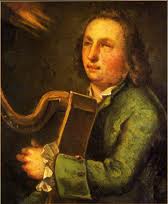Annotation:Fanny Power
X:1 T:Mrs. Trench T:Fanny Power M:6/8 L:1/8 B: John Lee – “A Favourite Collection of the so much admired old B:Irish Tunes, the original and genuine compositions of Carolan” B:(Dublin, 1780, p. 7) F:https://www.google.co.uk/books/edition/A_Favourite_Collection_of_old_Irish_Tune/QEMSNkpd_80C?hl=en&gbpv=1 Z:AK/Fiddler’s Companion K:C V:1 c2G cde|f2e d2c|{d}B2A GBG|B2c d2f| edc egg|a2d Td2c|TB2A GcB|c3 c3|| ge/f/g ge/f/g|cec cec|af/g/a af/g/a|dfd dfd| efg abc'| bc'd' gag|e2c ded |c3c3|| V:2 clef = bass C,3E,2C,|D,2E,F2,D|G,3G,,3|D2CB,2G,| C3C,3|F,3F,,3|G,3G,,3|C,3C,3|| C,3G,3|E,3C,3|F,3F,,3|F,3D,3| C3 F,3|G,3B,3|C2E,F,2G,|C,3C,3||
FANNY POWER ("Fanny Poer" or "Fannuidh Power"). AKA and see "Fanny Poer," "Inghin ni Pudhar," "Madame Trench," "Miss Power," "Mrs. Trench (of Garbally)," "Planxty Fanny Powers." Irish, Air or Planxty (6/8 or 3/4 time). G Major (Complete Collection, O Canainn, O'Neill, Sullivan, Vallely): D Major (Bunting, Haverty): C Major (Thompson): A Major (O'Sullivan/Bunting). Standard tuning (fiddle). AB (Vallely): AABB (most versions). Composed before 1728 by blind Irish harper Turlough O'Carolan (1670–1738) in praise of Frances, the daughter and heiress of Carolan's patrons David and Elizabeth Power of Coorheen, Loughrea, Co. Galway (for whom see "Mrs. Power/Carolan's Concerto" and "David Power"). O'Carolan called her "the Swan of the Shore" from the fact that her father's residence was situated on the edge of Lough Riadh (Rea). When Fanny married in March, 1732, one Richard Trench of Garbally she became the "Mrs. Trench (of Garbally)" or "Madame Trench" by which title the air sometimes appears (although the song was probably composed prior to the union, as in the second verse Carolan says he hopes that he'll live to dance at her wedding). She was long-lived and provident, surviving to 1793, the mother of a future Lady (Clancarty), and Baron, Viscount and Earl (William Power Keating Trench, born in 1741 and created Baron Kilconnel in 1797) {Flood, 1906; O'Sullivan, 1983}.

Harper Rose Mooney (1740–1798) played it at the Belfast Harp Festival in 1792. Mooney, originally from County Meath and one of the few female harpers of her day, was, like many other musicians, blind, and was lead by a female servant whose name was Mary. The pair fatefully happened to be in Killala, County Mayo, in 1798, just at the time the French were landing at the spot in support of the Rising. The British troops took flight and this was the cause for furious celebrating among the townspeople, which Mooney was caught up in. Unfortunately, as the story goes, she became overly celebratory and literally drank herself to death on the occasion (Heymann, 1992). The melody appears in Belfast musician and collector Edward Bunting’s [1] (1773–1843) c. 1800 manuscript collection (copies in MS 29, p. 22, and MS 33, book 3, p. 15, held at the Library of Queen’s University, Belfast).
It has been reported that Seamus Begley has been playing "Fanny Power" in a set with country and western singer Marty Robbins' "El Paso" for waltzes!
- ↑ This appears to be a plagiarized reissue of Lee’s or Mulhollan's volumes, without the names of tunes, only numbers.

